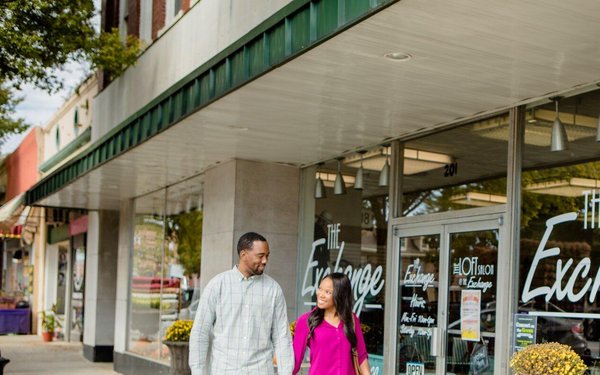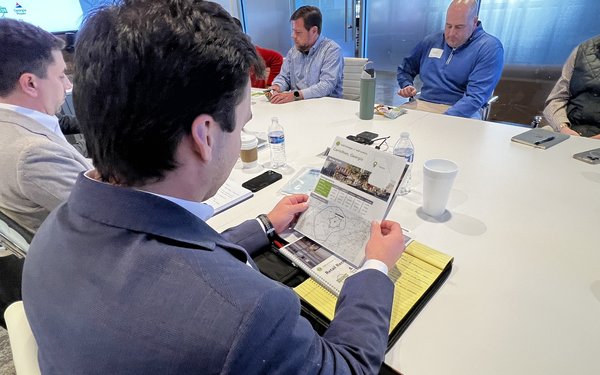Retail Takes Planning
Developers and communities alike understand that retail tenants can be important anchors in development projects. And in communities across the state, consumer spending continues to rise, further encouraging communities like yours to consider the retail mix that is best suited for your region.
To support your efforts, the Regional Economic Development team at Georgia Power continues to expand its Retail Ready program. A mix of education and customized solutions for communities who are ready to start or expand their retail recruitment.
“Overall, the Retail Ready program is about helping communities be better. And better is really defined by what they want it to be. So, better in downtown Atlanta might be different than better in downtown Rome,” shared Eric McDonald.
This year Eric led two educational events – bringing together site selection consultants, retail experts, and developers to share their knowledge with Georgia’s economic developers and leaders.
No matter which event or session you attended – there was a consistent theme: retail attraction takes planning.
Before you make the first phone call to a business or developer, make sure you start at the beginning. These tips from the Retail Ready events can help get you started.
Build Your Team
It’s essential that a community sets up their “recruitment team.” The recruitment team is a strategic group formed of representatives involved in the development process for your region.
The selected representatives should be able to answer questions about availability of land, power, water and sewer, and the local processes to develop or enhance commercial corridors.
This will vary by community but typically consists of a representative from planning and zoning, utility partners, and the development authority.
It’s also important to establish a primary contact from this team. Who will be the person responsible for liaising between the developer, real estate brokers, and local stakeholders?
“Whoever it is, they really need to be an advocate. The ideal person would be somebody that could go and talk to elected officials when a project in your community has hit some friction. This person can move the project forward and talk about the impact it will have on your community,” said Eric.
Know Your Region
Understanding what you are, and who you want to become as a community not only guides your retail strategy but helps you articulate your region’s value proposition when speaking with retail-location decision makers.
To answer these questions, there is a plethora of data available to understand current demographics and future projections.
- Demographics: Key population trends in the area.
- Households/Rooftops: Current household count within driving distance and projected new homes based on building permits.
- Commuting patterns: Does daytime commuter inflow affect regional spending power?
- Consumer spending: What do residents and commuters buy, and what goods or services are lacking locally?
It’s important to consider that the drive-time from a site or retail corridor is often more important than reviewing your data from the view of a city or county border. Shoppers are not afraid to cross town lines to access the products and services they value!
You can find some of this information on your own using trusted sources like the Site Selector on selectgeorgia.com. The updated reporting features allow users to select a drive-time radius from a site or draw a polygon to collect data on a specific area.
For more advanced research, Regional Economic Development Managers work with community partners to access information from the subscriptions and tools used by our research team like ESRI or Datafy.
Having this data readily available not only helps your community share with retailers why your region is the best place to invest but also have positive discussions with residents on why a specific business or corridor is being developed.
Plan for Retail
The right site for retail is about more than available land. A comprehensive review of your existing and planned retail sites and corridors is a key to successful recruitment strategies.
It is important to review your zoning regulations and ordinances. For example, certain restrictions may have been implemented years ago to address specific issues such as growth or traffic generated by different sources.
If those circumstances have changed or the original traffic generator is no longer present, it is worth assessing whether the current ordinances are still relevant and necessary.
“Before making any changes, talk to a developer or site selection consultant – they are the customers who are trying to use your rules in order to be successful in your community,” shared Eric about addressing changes to processes and policy.
The best practice is to assess the policies you have in place or are proposing. Creating a “test project” and running it through the process can help your retail team uncover any gaps or barriers.
Are You Retail Ready?
These first steps are a great way to start building your region’s retail strategy. For more tips on getting ready for retail, check out our other blogs from the Retail Ready program.
You can also subscribe to our quarterly email for updates on retail events and more coming in 2026.
Don’t forget that our team of Regional Economic Development Managers like Eric are available to help. Find your community's manager here.
Tips on Preparing for Retail Recruitment
Sep 25, 2025



